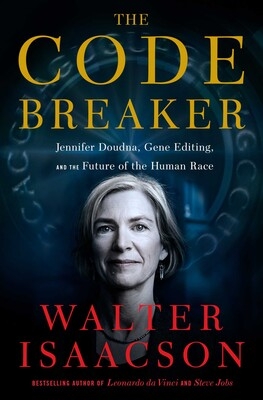
The Code Breaker
Jennifer Doudna, Gene Editing, and the Future of the Human Race
Seiten
2021
Simon & Schuster (Verlag)
978-1-9821-1585-2 (ISBN)
Simon & Schuster (Verlag)
978-1-9821-1585-2 (ISBN)
- Lieferbar
- Versandkostenfrei
- Auch auf Rechnung
- Artikel merken
The bestselling author of Leonardo da Vinci and Steve Jobs returns with a gripping account of how the pioneering scientist Jennifer Doudna, along with her colleagues and rivals, launched a revolution that will allow us to cure diseases, fend off viruses, and enhance our children.
In the spring of 2012, the Berkeley biochemist Jennifer Doudna and her collaborators turned a curiosity of nature into an invention that will transform the future of the human race: an easy-to-use tool that can edit DNA. Known as CRISPR, it opened a brave new world of medical miracles and moral questions. It has already been deployed to cure deadly diseases, fight the coronavirus pandemic of 2020, and make inheritable changes in the genes of babies.
The development of CRISPR and the war against coronavirus will hasten our transition to the next great innovation revolution. The past half-century has been an information-technology era, based on the microchip, the computer, and the internet. Now we are entering an even more momentous era, a life-science revolution. Children who study digital coding will be surpassed by those who study the code of life.
Should we use our new evolution-hacking powers to make us less susceptible to viruses and eliminate dreaded disorders? What a wonderful boon that would be! Right? And what about preventing congenital deafness or blindness? Or being very short? Or being depressed? Hmmm…How should we think about that? Should we allow parents, if they can afford it, to enhance the IQ or height or memory or muscles of their kids?
After helping to discover CRISPR, Doudna became a leader in wrestling with these moral and policy issues. Her life story illustrates that the key to innovation is connecting basic science to our everyday lives—moving discoveries from our labs to our bedsides—in ways that respect our moral values. It’s a thrilling detective tale that involves the most profound wonders of nature, from the origins of life to the future of our species.
In the spring of 2012, the Berkeley biochemist Jennifer Doudna and her collaborators turned a curiosity of nature into an invention that will transform the future of the human race: an easy-to-use tool that can edit DNA. Known as CRISPR, it opened a brave new world of medical miracles and moral questions. It has already been deployed to cure deadly diseases, fight the coronavirus pandemic of 2020, and make inheritable changes in the genes of babies.
The development of CRISPR and the war against coronavirus will hasten our transition to the next great innovation revolution. The past half-century has been an information-technology era, based on the microchip, the computer, and the internet. Now we are entering an even more momentous era, a life-science revolution. Children who study digital coding will be surpassed by those who study the code of life.
Should we use our new evolution-hacking powers to make us less susceptible to viruses and eliminate dreaded disorders? What a wonderful boon that would be! Right? And what about preventing congenital deafness or blindness? Or being very short? Or being depressed? Hmmm…How should we think about that? Should we allow parents, if they can afford it, to enhance the IQ or height or memory or muscles of their kids?
After helping to discover CRISPR, Doudna became a leader in wrestling with these moral and policy issues. Her life story illustrates that the key to innovation is connecting basic science to our everyday lives—moving discoveries from our labs to our bedsides—in ways that respect our moral values. It’s a thrilling detective tale that involves the most profound wonders of nature, from the origins of life to the future of our species.
Walter Isaacson, University Professor of History at Tulane, has been CEO of the Aspen Institute, chairman of CNN, and editor of Time magazine. He is the author of Leonardo da Vinci; The Innovators; Steve Jobs; Einstein: His Life and Universe; Benjamin Franklin: An American Life; and Kissinger: A Biography, and the coauthor of The Wise Men: Six Friends and the World They Made.
| Erscheinungsdatum | 06.04.2021 |
|---|---|
| Verlagsort | New York |
| Sprache | englisch |
| Maße | 156 x 235 mm |
| Gewicht | 946 g |
| Einbandart | gebunden |
| Themenwelt | Literatur ► Biografien / Erfahrungsberichte |
| Sachbuch/Ratgeber ► Geschichte / Politik | |
| Sachbuch/Ratgeber ► Natur / Technik | |
| Geschichte ► Teilgebiete der Geschichte ► Technikgeschichte | |
| Naturwissenschaften ► Biologie ► Genetik / Molekularbiologie | |
| Sozialwissenschaften ► Soziologie ► Gender Studies | |
| Schlagworte | CRISPR CAS9 • Crispr/Cas9-Mediated Genome Editing • gene and genome editing • Nobelpreis Chemie • Nobelpreis Frau |
| ISBN-10 | 1-9821-1585-8 / 1982115858 |
| ISBN-13 | 978-1-9821-1585-2 / 9781982115852 |
| Zustand | Neuware |
| Informationen gemäß Produktsicherheitsverordnung (GPSR) | |
| Haben Sie eine Frage zum Produkt? |
Mehr entdecken
aus dem Bereich
aus dem Bereich
Buch | Softcover (2024)
Lehmanns Media (Verlag)
CHF 27,90
Vom Perceptron zum Deep Learning
Buch | Softcover (2022)
Springer Vieweg (Verlag)
CHF 27,95


